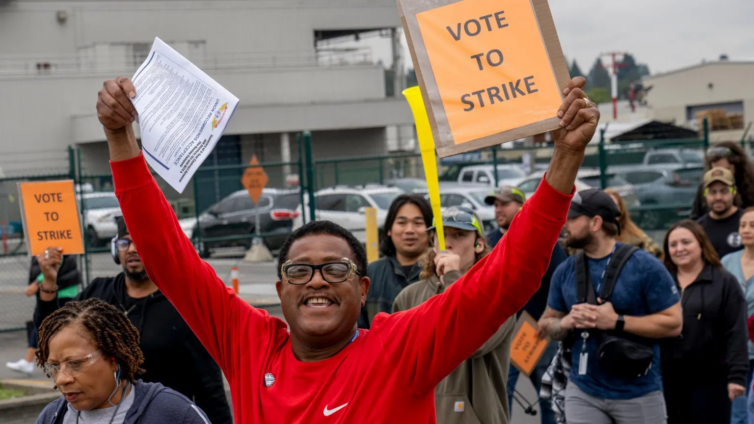Boeing workers strike as 25% pay rise rejected
3 min read

Boeing employees have initiated a strike after overwhelmingly rejecting a proposed deal that included a 25% pay raise. The strike began at midnight Pacific Time (0700 GMT) on Friday, involving over 30,000 workers in Seattle and Portland who are integral to the production of Boeing’s 737 Max and 777 aircraft.
This labor action marks another challenge for Boeing, which is grappling with severe financial losses and an ongoing struggle to restore its reputation following a series of safety controversies, including two fatal crashes involving its 737 Max model. The timing of the strike is particularly challenging for Boeing’s new CEO, Kelly Ortberg, who assumed the role last month with the goal of revitalizing the company.
Nearly 95% of the union members who voted rejected the tentative pay agreement, and 96% supported the strike action. Jon Holden, president of the International Association of Machinists and Aerospace Workers (IAM) District 751, emphasized the decisive nature of the vote, stating, “Our members spoke loud and clear tonight. We strike at midnight.”
Boeing responded to the strike with a statement indicating their willingness to return to negotiations. “The message was clear that the tentative agreement we reached with IAM leadership was not acceptable to the members,” the company said. They expressed a commitment to resetting their relationship with employees and the union and are prepared to negotiate a new agreement.
The rejected deal had included a substantial 25% pay increase spread over four years, alongside a commitment from Boeing to establish its next commercial aircraft assembly in the Seattle area if the project commenced during the contract’s term. Initially, the union had sought a 40% increase in pay and other improved benefits.
Before the vote, Ortberg made a final appeal to workers, cautioning that a strike could jeopardize the company’s recovery efforts. The current contract, which was established in 2008 following an eight-week strike that cost Boeing approximately $1.5 billion a month, expired at midnight on Thursday. The deal had been extended in 2014, but now negotiations have reached an impasse.
Greg Waldron, Asia Managing Editor at aviation news site FlightGlobal, noted that while strikes are never ideal from a management perspective, the current situation makes it particularly problematic. He added, “A great deal will depend on how long the strike lasts. Airline CEOs with 737 Maxes on order will be watching this closely.”
The timing of the strike also comes amid Boeing’s legal and financial difficulties. In July, Boeing agreed to plead guilty to a fraud charge and pay a nearly $244 million criminal fine related to the crashes of two 737 Max planes more than five years ago. The company faces additional lawsuits and investigations, including one concerning a mid-air incident involving a door plug on a new plane flown by Alaska Airlines in January.
Moreover, Boeing has been forced to scale back its production rates due to a cap on 737 Max production imposed by the U.S. Federal Aviation Administration (FAA). These operational constraints, combined with financial losses, have further compounded the company’s challenges.
As Boeing navigates these turbulent waters, the outcome of the strike and ongoing negotiations will be crucial in determining the company’s ability to stabilize and rebuild its operations.